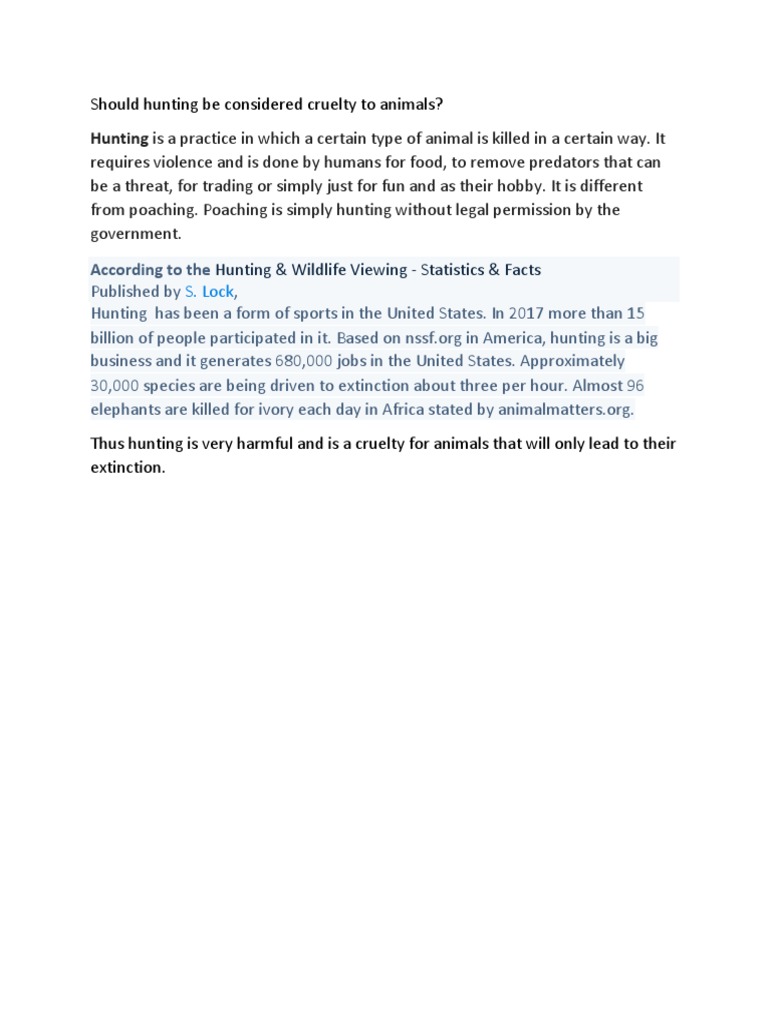The debate surrounding hunting as a practice has persisted through millennia, invoking passionate responses from both proponents and detractors. It is essential to dissect this traditional activity, scrutinizing its implications on animal welfare and ethical considerations. At the core of this discourse lies the question: Should hunting be categorized as cruelty to animals? This examination not only encompasses the immediate acts involved in hunting but also extends to philosophical inquiries regarding sentience, ecological balance, and the intrinsic value of life.
To unequivocally classify hunting as an act of cruelty necessitates an understanding of the emotional and cognitive capacities of sentient beings. Scientific research has increasingly acknowledged animal sentience, the ability of non-human creatures to perceive and feel emotions such as pain, fear, and distress. This acknowledgment has fueled the assertion that inflicting harm upon animals—our fellow sentient beings—can constitute a moral breach. Advocates against hunting argue that, irrespective of the intention behind it, the act itself yields suffering and therefore, cannot escape the label of cruelty.
While some might argue that hunting can be viewed through a utilitarian lens—suggesting that such acts can provide necessary sustenance or contribute to wildlife management—this perspective amplifies the complexity of the debate. Utilitarianism postulates that actions are justifiable if they result in the greatest good for the greatest number; however, this notion is fraught with contradictions when applied to animal welfare. Can the cessation of life truly be justified by the supposed benefits of population control or the satisfaction of human cravings? This question beckons deeper philosophical inquiries into morality, ethics, and the human condition.
Moreover, the assumption of an obligation toward wildlife management, often cited by hunters as a justifiable reason for their activities, necessitates reevaluation. Do humans possess the right to govern animal populations, determining life and death within their ranks? This presumption assumes a superiority that is contentious at best. Ecologists warn against the repercussions of interfering with ecosystems under the guise of management. The delicate interdependencies among species and their habitats can be disrupted by hunting practices, leading to unforeseen ramifications that ultimately disturb nature’s balance. Thus, the argument for hunting as a necessary evil for ecological stability raises more questions than it answers.
The cultural and historical contexts surrounding hunting further complicate this discourse. For some communities, hunting represents an integral aspect of identity and heritage. Ritualistic hunts, intertwined with cultural beliefs and traditions, are often framed as acts of respect toward the natural world. Yet, does historical precedent provide immunity from ethical scrutiny? The mere existence of a practice for centuries does not absolve it of moral implication. As societies evolve, so too must their ethical constructs, particularly those that confront the suffering of sentient beings.
Additionally, it is important to recognize the psychological phenomena that underpin the human fascination with hunting. There exists an intrinsic allure toward the act—and perhaps it can be traced to a more primal instinct. The engagement with nature, the thrill of the chase, and the culmination of skillful prowess stimulate an existential satisfaction. Yet, this very fascination uncovers a peculiar duality: the simultaneous embrace of life and death. It raises the query—do these sentiments imbue hunting with a deeper philosophical significance? Or are they but a rationalization for inflicting pain upon innocent beings?
Despite the romanticization of the hunter’s experience, one must consider the consequences that potentially extend beyond personal gratification. Hunters often speak of the respect earned through their endeavors, heralding a close connection to nature and the cycle of life. Yet this connection can be perceived as a paradox. If reverence for nature includes an understanding of its intrinsic value, does it not lead to the conclusion that taking a life for recreation is antithetical to that very reverence? This conflict epitomizes the moral quandary that surrounds hunting—a collision between admiration for the natural world and the helplessness it sometimes endures at human hands.
The philosophical implications also encompass a burgeoning recognition of animal rights, championed by numerous activists and scholars. By framing this debate within the context of rights—rights to life, freedom from suffering, and autonomy—the argument against hunting gathers considerable momentum. The assertion that non-human beings possess intrinsic rights is becoming difficult to dismiss in light of evolving moral philosophies and societal values. If one accepts the premise that animals have rights akin to humans, then hunting, with its inherently violent nature, becomes a grievous violation of these principles.
In conclusion, the inquiry into whether hunting should be labeled as cruelty to animals reveals an intricate tapestry of ethical, philosophical, and ecological issues. While some may cling to romantic notions of hunting as a rite of passage or a tool for wildlife conservation, these narratives can increasingly be challenged by the growing recognition of animal sentience, rights, and the moral obligation humans have towards other living beings. As societal awareness evolves and philosophical perspectives expand, the potential for a paradigm shift regarding our relationship to animals and the justification of hunting practices may indeed be on the horizon. It is with this critical lens that the conversation must persist, for the ethics of our interactions with the natural world—whether adversarial or harmonious—determine the legacy we carve into the fabric of life on this planet.








